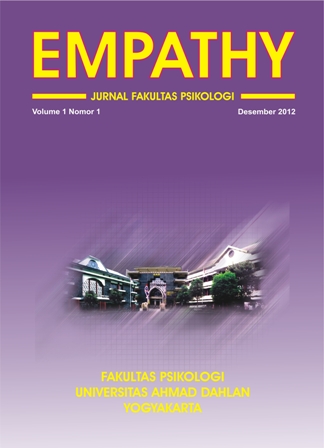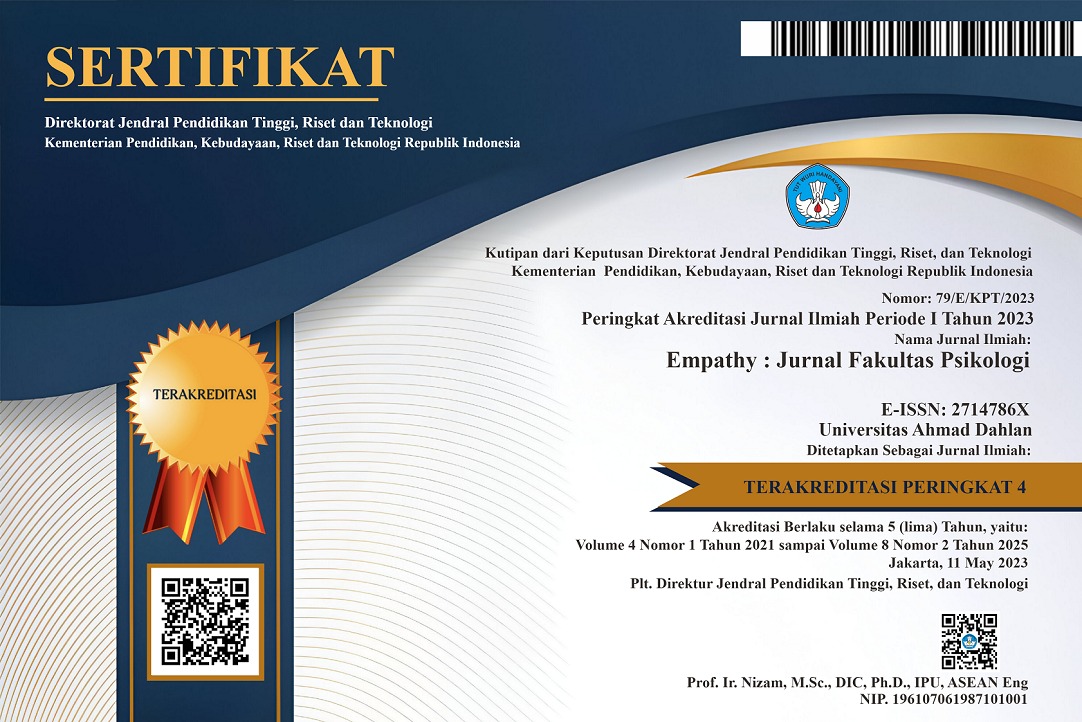Improving students' spiritual intelligence through ISMUBA teacher competencies
DOI:
https://doi.org/10.12928/empathy.v7i1.28148Keywords:
Improvement, Spiritual Intelligence, Students, Teacher Competency, ISMUBA.Abstract
The problem of the immoral decline of the younger generation is not something that should be kept secret any longer. So, a solution is needed to overcome these problems to shape the nation's character, which significantly influences the quality of morals and religious intelligence, which is not only intellectually intelligent but also emotionally and spiritually intelligent. Increasing students' spiritual intelligence through the competence of ISMUBA teachers is necessary and an attractive solution to achieving learning and educational goals. This research seeks to explore the competence of ISMUBA teachers and the supporting and inhibiting factors in increasing spiritual intelligence. This research uses a qualitative-descriptive method. The results of a study on growing students' spiritual intelligence through the competence of ISMUBA teachers by using an interactive learning approach, getting used to worship and doing good deeds, and providing examples and habits. The internal supporting factors stem from students' high self-awareness, so they automatically carry out religious practices that can increase their spiritual intelligence. External factors include the role of teachers as motivators, mentors, and directors and the role of parents as supporters as well as advisors, directors, and motivators of children. The inhibiting factor is a low level of self-awareness, which causes laziness and a lack of enthusiasm to carry out activities that can increase spiritual intelligence. Meanwhile, external obstacles are family conditions and the influence of the surrounding environment.
References
Handayani, A. B., Widodo, H., & Wahyudi, W. E. (2019). Penerapan kurikulum ISMUBA terhadap pembentukan karakter Islami siswa SMP Muhammadiyah Banguntapan. Al-Tadzkiyyah: Jurnal Pendidikan Islam, 10(2), 231–243. http://dx.doi.org/10.24042/atjpi.v10i2.4558
Zulfarno, M., Mursal, & Saputra, R. (2019). Aktualisasi pendidikan karakter dalam pembelajaran Al-Islam dan Kemuhammadiyahan di SMA Muhammadiyah Kota Padang. Ruhama: Islamic Education Journal, 1(2), 117–131. https://doi.org/10.31869/ruhama.v2i2.1698
Mutmainah, H., & Mufid, M. (2018). Upaya guru PAI dalam peningkatan kecerdasan emosional dan spiritual peserta didik di SMAN 1 Bojonegoro. At-Tuhfah, 7(1), 80–95. https://doi.org/10.36840/jurnalstudikeislaman.v7i1.118
Asyari, H. (2020). Pembentukan spiritualitas dan karakter anak dalam perspektif Lukman al-Hakim. At-Tarbiyat: Jurnal Pendidikan Islam, 3(2), 159–171. https://doi.org/10.37758/jat.v3i2.217
Shodri, H., & Susanti, D. (2022). Strategi guru PAI dalam meningkatkan kecerdasan spiritual peserta didik di Sekolah Menengah Atas (SMA) Negeri 2 Situbondo. STIT Togo Ambarsari, 1(1), 30–53. https://doi.org/10.59106/abs.v1i1.5
Hasan, K. (2020). Relationship of professionalism with religious moderation in Islamic religious. At-Tarbiyat: Jurnal Pendidikan Islam, 3(2), 119–130. https://doi.org/10.37758/jat.v3i2.223
Fadli, H. N. N. A., & Yusutria. (2022). Peran guru PAI dalam mengembangkan kecerdasan spiritual siswa SD Negeri Wanacipta. In Seminar Nasional Hasil Pelaksanaan Program Pengenalan Lapangan Persekolahan (pp. 1760–1764). https://seminar.uad.ac.id/index.php/semhasmengajar/article/view/9873
Yusutria, E. A. (2022). Strengthening and Kemuhammadiyahan-based character education at Muhammadiyah Elementary School Nitikan Yogyakarta. Al-Ta’lim, 29(1), 35–50. https://doi.org/10.15548/jt.v29i1.711
Yuherman, C., Yusutria, Febriana, R., Charles, C. (2022). Konsep pendidikan Ki Hajar Dewantara sebagai ruh sistem pendidikan Indonesia dalam pembentukan karakter generasi bangsa. Jurnal Kajian Agama Hukum dan Pendidikan Islam, 3(1), 1–20. https://doi.org/10.32493/kahpi.v4i1.p1-20.23305
Seraphin, K. D., Harrison, G. M., Philippoff, J., Brandon, P. R., Nguyen, T. T. T., Lawton, B. E., & Vallin, L. M. (2017). Teaching aquatic science as inquiry through professional development: Teacher characteristics and student outcomes. Journal of Research in Science Teaching, 54(9), 1219–1245. https://doi.org/10.1002/tea.21403
Yusutria, & Sutarman. (2021). Profesionalisme guru dalam menumbuhkan nilai karakter siswa berbasis nilai-nilai budaya 5S (Senyum, Sapa, Salam, Sopan, Santun) di SMK 1 Muhammadiyah Kasihan Bantul Yogyakarta. Jurnal Pendidikan Islam - UHAMKA, 12(2), 74–98. https://doi.org/10.22236/jpi.v12i2.7974
Yusutria, Y. (2020). Peran wanita karir dalam menanamkan nilai-nilai agama bagi anak melalui pendekatan religius (Studi kasus Kota Padang Sumatera Barat). Gulawentah: Jurnal Studi Sosial, 5(1), 17. https://doi.org/10.25273/gulawentah.v5i1.6453
Pohan, S., & Sirait, F. Y. (2021). The strategi of principal in the implementation of character education in SMP Muhammadiyah 1 Medan. In Proceeding International Seminar on Islamic Studies (Vol. 2, pp. 242–248). https://jurnal.umsu.ac.id/index.php/insis/article/view/6252
Wulandari, D. (2021). Kompetensi profesionalisme guru. Aksioma Ad-Diniyah, 9(1), 318–336. https://doi.org/10.55171/jad.v9i1.535
Asmuki, A. & Al Aluf, W. (2018). Pendidikan karakter di pesantren. Edupedia, 2(2), 1–10. 10.35316/edupedia.v2i2.325
Hamami, T., Suud, F. M., & Rahmatullah, A. S. (2019). Al-Islam dan Kemuhammadiyahan sebagai basis pendidikan karakter. Al-Asasiyya: Jurnal Basic Education, 4(1), 71–91. https://doi.org/10.24269/ajbe.v4i1.1972
Baidarus. (2018). Muhammadiyah dan pendidikan karakter di Indonesia. Jurnal Islamika, 1(2), 25–44. https://ejurnal.umri.ac.id/index.php/JSI/article/view/1101
Nawapuspita. (2019). Respon siswa kelas XI terhadap materi pengertian, ruang lingkup, dan nilai-nilai pendidikan Kemuhammadiyahan di SMA Muhammadiyah 2 Pontianak tahun ajaran 2016/2017. Tarbawi Khatulistiwa: Jurnal Pendidikan Islam, 5(1), 45–56. DOI:10.29406/tbw.v5i1.2769
Yasin, H., & Rachmawati, T. S. (2021). Pengaruh profesionalisme guru terhadap kecerdasan emosional (EQ) siswa. Tahdzib Al-Akhlaq: Jurnal Pendidikan Islam, 4(2), 40–59. https://doi.org/10.34005/tahdzib.v4i2.1629
Irwansyah, M., Nasution, M. D., & Afrida, A. (2019). Urgensi kompetensi kepribadian guru dalam sistem pendidikan perspektif hadits nabawi. Tarbiyah Islamiyah: Jurnal Ilmiah Pendidikan Agama Islam, 9(2). https://doi.org/10.18592/jtipai.v9i2.3421
Indriyani, E. N. (2022). Profesionalitas guru PAI dalam menumbuhkembangkan kecerdasan spiritual peserta didik di era merdeka belajar di SD Negeri 086/X Harapan Makmur. Jurnal Pendidikan Guru, 3(2), 55–65. https://doi.org/10.47783/jurpendigu.v3i2.336
Dwija, I. W. (2020). Metodologi penelitian pendidikan. Yayasan Gandhi Puri.
Asep, K. (2018). Metodologi penelitian pendidikan. Remaja Rosda Karya.
Yuesti, A., Agung, A. A. P., & Latupeirissa, J. J. P. (2019). Metode penelitian bisnis kuantitatif dan kualitatif. [E-book Volume 1, Section]. https://doi.org/10.1234/karti.v1i1.47
Murphy, E., Dingwall, R., Greatbatch, D., Parker, S, & Watson, P. (1998). Qualitative research methods in health technology assessment: A review of the literature. Health Technology Assessment, 2(16). https://doi.org/10.3310/hta2160.
Samsu, S. (2021). Metode penelitian: teori & aplikasi penelitian kualitatif, kuantitatif, mixed methods, serta research and development. Pustaka Jambi. Retrieved from https://www.researchgate.net/publication/343162238
Mays, N., & Pope, C. (2019). Quality in qualitative research. The Oxford Handbook of Qualitative Research Methods in Healthcare (Chapter 15). Wiley. https://doi.org/10.1002/9781119410867.ch15
Kosasih, A., Fahrullah, T., A., & Mahdi, S. (2023). Penguatan pendidikan karakter di pesantren tradisional Jawa Barat. Midang: Jurnal Pengabdian Kepada Masyarakat, 1(1), 1–7. https://doi.org/10.24198/midang.v1i1.43840
Fathurrohman, M. (2016). Pengembangan budaya religius dalam meningkatkan mutu pendidikan. Ta’allum: Jurnal Pendidikan Islam, 4(1), 19–42. https://doi.org/10.21274/taalum.2016.4.1.19-42
Tunnisa, A., & Achruh, A. (2023). Pelaksanaan mewujudkan guru profesional. Journal of Management Education, 2, 129–148. https://doi.org/10.1234/jme.2023.2.129-148
Pratomo, I. C., Nurhuda, T., Soipah, S., & Noviantie, A. (2024). Pengembangan profesionalisme guru dari perspektif pedagogik. Jurnal Basicedu, 8(3). https://doi.org/10.31004/basicedu.v8i3.7541
Nadirah, S., Nasar, I., Sabir, A., Lahiya, A., Zulfikhar, R., & Zulharman, Z. (2023). Pengaruh Kinerja Dan Kualifikasi Akademik Guru Terhadap Mutu Pendidikan. Journal of Education, 6(1), 2064–2071. https://doi.org/10.31004/joe.v6i1.3198
Zubairi, A., Abnisa, A. P., & Musthofa. (2022). Profesionalisme guru pendidikan agama Islam era 4.0. In International Conference and Visiting Scholars 2022, 41-61. INSURI Ponorogo, Indonesia: Universiti Sains Malaysia.
Hasnianti, H., Razak, M., & Firman, A. (2023). Pengaruh kompetensi pedagogik, profesional, kepribadian, dan sosial terhadap kinerja guru SD Kecamatan Pasimasunggu Kabupaten Kepulauan Selayar. Cendekia Akademika Indonesia (CAI), 2(1), 56–68. https://e-jurnal.nobel.ac.id/index.php/cai/article/view/3542
Ilyas, I. (2022). Strategi peningkatan kompetensi profesional guru. Journal of Innovation, Evaluation, and Development of Learning, 2(1), 34–40. https://doi.org/10.54371/jiepp.v2i1.158
Mufti, U., & Widodo, H. (2021). Kurikulum ISMUBA di SD Muhammadiyah Banguntapan. Journal of Islamic Education Innovation, 2(1), 85–92. https://doi.org/10.26555/jiei.v2i1.906
Duriani, D., Rama, B., Pajarianto, H., & Sari, P. (2021). Thematic learning in Kindergarten Based on Al-Islam Kemuhammadiyahan and local wisdom. Journal of Observation and Early Childhood Education, 5(2), 2220–2230. https://doi.org/10.31004/obsesi.v5i2.1171
Aini, S. (2020). Implementasi nilai karakter melalui Al-Islam dan Kemuhammadiyahan di SMP Muhammadiyah 1 Medan [Master’s thesis, Fakultas Agama Islam Universitas Muhammadiyah Sumatera Utara Medan]. http://repository.umsu.ac.id/handle/123456789/13785
Aritaningsih, R. (2018). Peran guru Al-Islam dan Kemuhammadiyahan dalam membentuk karakter religius siswa. Tajdida, 16(1), 38–53. https://doi.org/10.21154/tajdida.v16i1.1155
Suryanti, E. W., & Widayanti, F. D. (2018). Penguatan pendidikan karakter berbasis religius. In Conference on Innovation and Application of Science and Technology (CIASTECH, 12 September 2018): Inovasi IPTEKS untuk mendukung pembangunan berkelanjutan. 254–262. Universitas Widyagama Malang. https://doi.org/10.31328/ciastech.v1i1.630
Fauziatun, N., & Misbah, M. (2020). Relevansi Kecerdasan Emosional (EQ) dan Kecerdasan Spiritual (SQ) dengan Pendidikan Karakter. Journal of Education, 8(2), 142–165. https://doi.org/10.24090/jk.v8i2.5260
Yanto, A. D., & Haris, A. (2022). Internalisasi nilai-nilai karakter religius di SMP Muhammadiyah 2 Malang. Al-Allam Journal of Education, 3(1), 43–54. https://doi.org/10.51302/alallam.v3i1.565
Nurjanah, F., Triwoelandari, R., & Nawawi, M. K. (2018). Pengembangan bahan ajar tematik terintegrasi nilai-nilai Islam dan sains untuk meningkatkan karakter religius siswa. Pendas Journal of Basic Education Scientific, 3(2), 178–181. https://doi.org/10.23969/jp.v3i2.1393
Wagner, L. (2019). Good character is what we look for in a friend: Character strengths are positively related to peer acceptance and friendship quality in early adolescents. Journal of Early Adolescence, 39(6), 864–903. https://doi.org/10.1177/0272431618791286
Downloads
Published
Issue
Section
License
Authors who publish with Empathy: Jurnal Fakultas Psikologi agree to the following terms:
- Authors retain copyright and grant the journal right of first publication with the work simultaneously licensed under a Creative Commons Attribution License (CC BY-SA 4.0) that allows others to share the work with an acknowledgment of the work's authorship and initial publication in this journal.
- Authors are able to enter into separate, additional contractual arrangements for the non-exclusive distribution of the journal's published version of the work (e.g., post it to an institutional repository or publish it in a book), with an acknowledgment of its initial publication in this journal.
- Authors are permitted and encouraged to post their work online (e.g., in institutional repositories or on their website) prior to and during the submission process, as it can lead to productive exchanges, as well as earlier and greater citation of published work.

This work is licensed under a Creative Commons Attribution-ShareAlike 4.0 International License.




